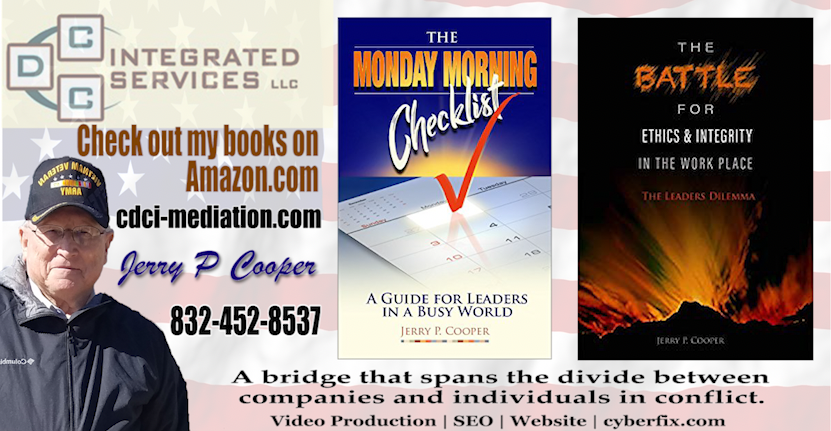Volume 5 | Issue 9
Putting it in contextA message from CDC Integrated Services, LLC
Speaking About Context (Again)
Speaking About Context (Again)
I place great importance on context because it matters in analyzing problems and crafting solutions. However, context does not replace principle, and those who defend taking the easy path try to camouflage this action by wrapping it in the mantle of a principle. Those who read this and still think there is a place for situational ethics need to think about the simple fact that almost all the examples people use to prove this point relate to taking shortcuts or making compromises that, usually, would not be considered.
People need to remember that a dividing line exists between those who work in a business environment and those who work for educational institutions or government agencies and departments. While not universal in the public sector, a significant number of those who make their living away from the private sector believe being fair is more important than being ethical. They may argue they are both, but those who make this argument are ignorant of, or at least unaware, that fairness decisions are rarely fact-driven.
That is the flaw in almost every argument offered in defense of fairness because being fair to one person almost always means being unfair to someone else. For those in the public sector, the laws and regulations guide much of their day-to-day decisions, and it is important to remember that laws and ethics do not always run in parallel.
In fact, many laws exist that are not ethical. Our tax laws and regulations discriminate against those who are more successful financially than others. Land developers are treated differently than farmers. In some countries outside the United States, girls are denied the right to an education. In this country, you don’t choose where to educate your child unless you can afford to send him or her to a private school, or you decide to home school your child.
Ethics is everyone’s favorite talking point when they read about some wrong being reported. I can only shake my head over people’s outrage. It’s as if they are completely unaware that movies, television shows, magazine articles, many books, and their own behavior seem to take situational ethics as a given. This bias creates a widespread misconception about ethics, and why ethics failures have reached such epidemic proportions in government, media, and entertainment.
For those who make their living in the business, world ethics cannot be divorced from its moral roots. As I discuss in my newsletter, Putting It In Context, codes of behavior/standards of conduct must be based on values that are measured and acted on objectively. Doing the right thing at the right time for the right reason¹ isn’t possible unless you accept this basic premise.
A common practice of those who see no conflict by defining things primarily through the lens of situational ethics is their practice of treating morality and ethics as the same. To borrow a word heard a great deal in the media these days, people “conflate” morality and ethics. I offer a common example to illustrate this point.
A favorite device in ethics training and in college classes is to tie ethics to a moral dilemma. Instructors often start with the premise that in economically depressed areas, once a person gets a job, they will do pretty much anything to keep the job. An employee in this circumstance will do what the bosses want him or her to do and will ignore the needs/interests of others. In these training examples “others” are sometimes called the third-party.
In these scenarios, the instructors pit the employee’s self-interest not to get into trouble against a perceived grievance by a third-party. The goal of many of these training exercises is to lead the “student” to the idea of whistleblowing. These exercises often wrap the discovery of a wrong-doing as a moral wrong, and the employee is seen as being in a moral conflict if the wrong is ignored. I see this as a theatrical device that diminishes the ethical challenges employees face in the course of their work.
A person never reaches the decision to blow the whistle on wrong-doing lightly or casually.
It is a decision fraught with risk, whether he or she works for a company or a governmental agency. The employer often retaliates by labeling such employees as disloyal and punishing them in a number of ways. In the past, careers and reputations were ruined. Sadly, many federal and state agencies are still the case.
It is less so now in the private sector because many companies have adopted rules to protect the whistleblower, but the new attitudes are not universal. What these instructional devices miss is that the positive norms that frame an employee’s behavior are not insurmountable challenges, but simply require focus, repetition, and practice.
Food For Thought: A vest, as an item of clothing, always makes a statement, but depending on the context, those declarations vary a great deal. (John Gondelman)

Get In Touch
(832)-452-8537
(281)-861-4947
jerry@cdci-mediation.com
